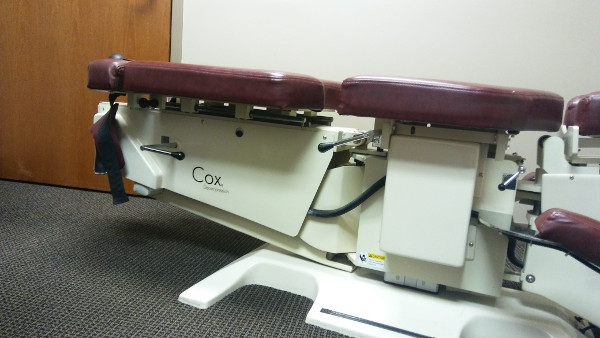Why Can’t Tiger Woods Find Back Pain Relief?
This is why we do what we do at Algonquin Chiropractic.
This is why we make the recommendations that we do for low back pain.
It’s the same reason I spent hundreds of hours studying and getting certified in the Cox Technic.
It’s also why we use physical therapy modalities, exercises, manipulation, Cox Technic, orthotics, whole body standing vibration, traction and work with people’s diet and recommend targeted nutrition.
Why do we do all this? We do it so that YOU DO NOT become Tiger Woods. Tiger is the perfect example of how back pain can RUIN people’s lives.

How Back Pain Ruined Tiger’s Career
Low back pain has a 60% recurrence rate in one year and a 94% recurrence rate after four years. Tiger’s pain, which some speculate started as early as May 2010, has continued to recur over the years.
Low back pain is also the number ONE cause of disability in the United States and worldwide. Tiger was disabled from back pain and did not golf (work) for long periods of time after his first back surgery in 2014.
Of all opioid addicts, 59-70% became addicted after being prescribed opioids due to back pain. Tiger had a problem with opioids in the past, didn’t he?

Why Surgery Hasn’t Worked
Research shows spinal surgery re-operation rates is greater than 22%, serious postoperative pain and disability can be experienced by more than 29% of patients, death rates following spinal surgery are estimated to be 1 per 1000. Did you know that? (What if 1 in 1000 chiropractic patients died or had a serious adverse event? Do you think you would know about that from your doctor and the media? Chiropractic is very effective and extremely safe.)
Tiger had several low back operations. His FOURTH low back surgery was a lumbar fusion surgery in 2017.
As you would imagine, Tiger had the best surgeons, (do you think the same surgeon did all the surgeries? And if he did why would you let a guy operate on you FOUR times if it keeps happening?) the best physical therapists, the best massage therapists, the best of everything available to him, and none of these “experts” could help him find lasting back pain relief.
And recently, Tiger had his FIFTH low back surgery. (It must be pretty routine for him now!)
Why His Comeback Failed
When Tiger made his comeback, I was asked if I thought he would re-injure himself. My answer was yes. Usually, after fusion surgery, reinjury occurs within 3-5 years. I predicted it would occur sooner for Tiger due to his repetitive swinging of the golf club.
Tiger made it about 4 years, right in line with what the research says, (and longer than what I predicted).
When you have a spinal fusion surgery, the stress goes above and below the fused segments, it is only a matter of time before an injury occurs. After all, you are putting more stress on a structure than what it was designed for.
Tiger has probably spent more than $1,000,000 on his low back. Can you and I afford that?
Unfortunately, this is all too common. I see and hear about this everyday.
The only way to not become Tiger is prevention. The only profession that even has a back pain prevention program is chiropractic.
Therefore, the answer to how to treat back pain is chiropractic care.

The Problems with the Medical Approach to Back Pain
I do not have any inside information, I just know what I read online about Tiger, just like you. But it sounds like Tiger has been treated “medically” for his lower back.
The typical neck pain, low back pain, sciatica, stenosis or disc herniation patient will go to their medical doctor. While there, the doctor will perform a cursory exam and usually give some medication, maybe opioids and advice on rest and to follow up in 4-6 weeks if it is not better.
Here are some problems with that approach:
Research shows the best treatment for back pain is a combination of spinal manipulation (chiropractic) and anti-inflammatory medications. The anti-inflammatory medication will help with the inflammation and the spinal manipulation will improve spinal biomechanics for faster, longer lasting relief. It won’t work as well or last as long without chiropractic care.
Problematic Side Effects
You do not want to be on anti-inflammatory medications long term. Generally, side-effects will not start until after 2-3 months of regular use. We all know people who can’t take a few doses because it upsets their stomachs. One of my patient’s suffered a perforated ulcer which required immediate major abdominal surgery to correct, after ONE dose of an anti-inflammatory medication.
According to WebMD, the most common side effects to anti-inflammatory medication (NSAIDS) are:
- Stomach problems, including pain, constipation, diarrhea, gas, nausea, and stomach ulcers
- Kidney problems
- Anemia
- Dizziness
- Swelling in the legs
- Abnormal liver tests (blood tests)
- Headaches
- Easy bruising
- Ringing in the ears
- Rash
GI bleeding is also common. According to drugs.com, here are the signs and symptoms to look for:
- Blood in your vomit, and/or vomit that looks like coffee grounds
- Dark or bright red blood in your bowel movements
- Bleeding from your rectum
- Cramping and pain in your abdomen
- Fatigue, weakness, and/or dizziness
- Shortness of breath
- Pale skin or gums, and sweaty or clammy skin
- Faster heartbeat than usual
- Urinating less than usual or not at all
- Fainting or loss of consciousness
Problematic Addiction
We all know the terrible problems opioid addiction is causing in our country. People can become addicted in a little as 5 doses! Therefore, this is not a long-term solution.
I treated a patient who was taking 78 Norco a month. I asked, “Where do you get them?” His answer, “My doctor.”
After we worked on him, he was down to 45 Norco a month. Instead of 2-3 per day he was taking 1-2 per day, which was a nice improvement. He went back and told his doctor that he was seeing the chiropractor and has decreased his Norco use by a third. His doctor was pleased.
Problematic Doctors
As a physician, I am constantly referring my patients to competent doctors for one reason or another, to help them to improve the quality of their lives. I would expect other doctors to do the same. But do they?
The doctor I mentioned above has never called or referred a patient to my office for care, even though he has dozens of patients who could benefit immensely from chiropractic care.
Why don’t medical doctors make proper referrals to chiropractors?
Some doctors may be ignorant of the dozens of studies showing the benefits of safe, effective chiropractic care. Some may also discriminate against chiropractors.
Your doctor may not know that if you start care with a chiropractor you are 50% less likely to fill an opioid prescription. (That’s what the study says, anyway. I bet the number of people who see a chiropractor that do not fill an opioid prescription is much, much higher than 50%.)
Your doctor also may not know about the study that showed the Cox Technic was more effective than physical therapy for patients with leg pain such as sciatica or stenosis.
Finally, your doctor may be told from “corporate” that they are not to refer any patients outside of “the system” and to keep everything “in house.”
But should medical doctors be referring to chiropractors?
See what 150,000 medicals doctors say here:
And the list goes on….
Physical Therapy vs. Chiropractic Care
What your doctor would do next is to recommend physical therapy. Patients with chronic conditions that come into my office have often had two or more rounds of physical therapy. Physical therapy can cost up to $400 per 30 minutes session, but does it work?
When compared to head-to-head, chiropractic care has been shown to be more effective, to get people better faster and to have longer lasting relief than physical therapy. And it will not cost you as much!
Any practitioner who treats low backs recommends a similar low back exercises and rehab. So, what if you could get the back pain relief of chiropractic care and spinal manipulation AND have the same exercises you would do in PT? That is what we do.

Pain Management vs. Chiropractic Care
So far you have been on anti-inflammatory medications, steroids, muscle relaxants, possibly opiods, have had X-rays and an MRI had 2–6-week sessions of physical therapy and you are still not well and pushing $10,000 or more in medical bills.
The next step is “the pain doctor.”
Pain management doctors will use more medications, and if they are not successful, will perform spinal injections.
Epidural steroid injections or ESI are injections of steroids in and around the disc and the nerve.
How do these injections work? They work by decreasing inflammation the same way as oral anti-inflammatories and oral steroids do. The only difference is they will inject the medicine near the problem area.
The problem is the same as with oral medication. You temporarily decrease swelling and inflammation, but the problem causing the inflammation is not addressed. Biomechanics are not fixed. Muscles are not strengthened. That is why some people get 2-3 shots per year, and yet the problem continues to come back. Once you see a pain management doctor, you may have to see them the rest of your life.
I have had success when patient’s get a spinal injection and then we treat them right afterwards, inflammation is decreased and we are working on decompression of the spine with the Cox Technic and improving biomechanics with spinal manipulation and exercise.
I do not recommend getting a spinal injection without appropriate treatment after the injection. The long-term success rate of spinal injections is very low, 15% success rate after 2 years.

Surgery vs. Chiropractic Care
The next step, if the spinal injection does not work, would be surgery. We want to do everything we can to prevent you from going to surgery.
Surgery can bring about more surgery (like it did for Tiger), more opiods, more medications, more injections, more stress, more mental anguish, more physical therapy, more medical bills and the cycle continues.
This is where I meet people. They are stuck somewhere in the cycle.
Will surgery help you? Watch this:
(If MRI’s made people well I would be out of business! A lot of my patients have had 2-3 MRI’s or more!)
How to Treat Back Pain with Chiropractic Care
When patients come in who have been stuck in this never-ending cycle for months or years the very first thing we have to do is re-train their brains!
Patients need to think differently about the approach to low back pain relief.
Question: “Mrs. Patient if we keep doing the same treatments that have not helped you in the past and you have been doing for the last XXXX months or years, do you think you will get better?”
A few people actually say “YES.” People have a STRONG need to rationalize their choices, so much so that it is often at the expense of common sense.
“Mrs. Patient since you have done XYZ treatments for the last XXX months or years and it has not helped, we are not going to do those treatments. Instead, we are going to do something different, does that make sense?”
Patients realize that we cannot keep doing the same treatments and expect different results, our treatment programs are unique, effective and individualized for each patient’s specific condition.

The Examination Process
After our consultation, thorough examination (after I do my exam, many patients say they have NEVER been examined like this before and they have been to numerous doctors and physical therapists!) and take or review any diagnostic imaging such as X-rays or MRIs, we determine if we can help.
If we accept that patient’s case, we will put together an individualized treatment plan that may consist of a combination of the following:
- Cox Technic
- Spinal manipulation
- Physical Therapy modalities
- Physical Therapy Exercises
- Orthotics
- Spinal Bracing
- Whole Body Standing Vibration
- Laser Therapy
- Diet, Nutrition and more….
The Lower Back Pain Remedy You’re Looking For
Not only will a patient know what their treatment plan is, they will also know what their insurance covers and what their out-of-pocket costs will be BEFORE we start treatment.
Know that if we accept you as a patient, there is a very, very good chance you will have the back pain relief you’re looking for.
All patient’s respond to our low back pain treatments at a different rate, generally we look for a 50% improvement in the first 4 weeks of care, most treatment plans are 8-12 weeks, some shorter, some longer.
Patients with severe, chronic conditions may only get 50% better, but with most patients we expect a resolution of their condition in 8-12 weeks.
Start Your Journey to Back Pain Relief Today!
Have you or a loved one been stuck in the “medical cycle?” Taking more medication than you want, limited in your activities, unable to sleep well or enjoy life?
Think differently.
Schedule a consultation and let’s see if we can help you!
What would you say if Harvard recommended chiropractic care?



